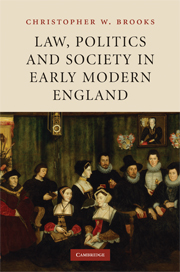Book contents
- Frontmatter
- Contents
- Preface
- Abbreviations and conventions
- 1 English history and the history of English law 1485–1642
- 2 Courts, lawyers and legal thought under the early Tudors
- 3 The initiatives of the crown and the break from Rome
- 4 Political realities and legal discourse in the later sixteenth century
- 5 The politics of jurisdiction I: the liberty of the subject and the ecclesiastical polity 1560 – c. 1610
- 6 The politics of jurisdiction II: multiple kingdoms and questions about royal authority
- 7 The absoluta potestas of a sovereign and the liberty of the subject: law and political controversy in the 1620s
- 8 The degeneration of civil society into a state of war 1629–1642
- 9 Law and ‘community’
- 10 The aristocracy, the gentry and the rule of law
- 11 Economic and tenurial relationships
- 12 The household and its members
- 13 The person, the community and the state
- 14 Conclusion
- Manuscript bibliography
- Index
- References
3 - The initiatives of the crown and the break from Rome
Published online by Cambridge University Press: 06 July 2010
- Frontmatter
- Contents
- Preface
- Abbreviations and conventions
- 1 English history and the history of English law 1485–1642
- 2 Courts, lawyers and legal thought under the early Tudors
- 3 The initiatives of the crown and the break from Rome
- 4 Political realities and legal discourse in the later sixteenth century
- 5 The politics of jurisdiction I: the liberty of the subject and the ecclesiastical polity 1560 – c. 1610
- 6 The politics of jurisdiction II: multiple kingdoms and questions about royal authority
- 7 The absoluta potestas of a sovereign and the liberty of the subject: law and political controversy in the 1620s
- 8 The degeneration of civil society into a state of war 1629–1642
- 9 Law and ‘community’
- 10 The aristocracy, the gentry and the rule of law
- 11 Economic and tenurial relationships
- 12 The household and its members
- 13 The person, the community and the state
- 14 Conclusion
- Manuscript bibliography
- Index
- References
Summary
Historiography
The early Tudor period is one of the few in English history where questions about the administration of justice and the effectiveness of the rule of law have been linked with considerations of the causes and impact of political instability and the capacity of one monarchical regime to govern more effectively than another. According to Polydore Vergil in the early sixteenth century, and Sir Francis Bacon in the early seventeenth, Henry VII was the monarch who restored law and order after the Wars of the Roses, a period in which political uncertainty and civil war were accompanied by magnate challenges to royal authority. Later on, early twentieth-century historians persistently depicted Henry VII as a ‘new monarch’, who released the nation from the thrall of ‘bastard feudalism’. In the 1950s and 1960s, Sir Geoffrey Elton shifted the emphasis from the first Tudor to his son, Henry VIII, and postulated a ‘revolution in government’, a view of the Tudor period that is reflected still in studies which see the sixteenth century as a critical stage in the making of the English state.
Although Elton's original insights arose primarily in connection with the organisation of the king's council and focused on the administrative genius and reforming character of the king's principal secretary during the 1530s, Thomas Cromwell, he subsequently attempted to show that Cromwell's general approach to governance included expansion of the use of legislation to accomplish policy objectives (including of course the jurisdictional breach with Rome), and a considerable interest in law reform.
- Type
- Chapter
- Information
- Law, Politics and Society in Early Modern England , pp. 30 - 50Publisher: Cambridge University PressPrint publication year: 2009

